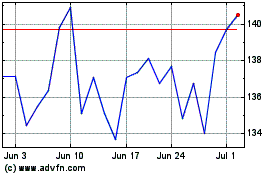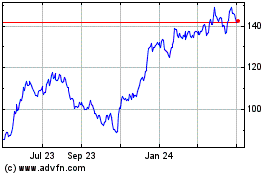Mixed NCO & Delinquency in October - Analyst Blog
17 November 2011 - 4:20AM
Zacks
Some regulatory filings by major credit card companies have
disclosed mixed results in credit card defaults and delinquency
rate for October 2011. According to these filings, three of the
nation's top six credit card companies reported a decline in card
defaults, while four of them recorded lower delinquency rates.
Bank of America Corporation (BAC),
Citigroup Inc. (C) and Discover Financial
Services (DFS) recorded a fall in their respective credit
card defaults while JPMorgan Chase & Co.
(JPM), American Express Company (AXP) and
Capital One Financial Corp. (COF) reported a surge
for the same.
Card companies usually write off the loans that are 180 days
past due, assuming those as uncollectible. For BofA, on an
annualized basis, net charges-off (NCO) rate fell to 5.98% in
October 2011 as against 5.99% in September 2011 and 10.15% in
October 2010.
However, on an annualized basis, Capital One’s NCO rate surged
from 3.90% in the prior month but decreased from 7.26% in the
prior-year month to 3.96% in October 2011. Also, JPMorgan reported
a surge in NCO rate to 4.18% of its total loan balance in October
2011 compared with 4.13% in September 2011 and 7.0% in October
2010.
In October 2011, delinquency rate, indicating the future rate of
default, dropped for BofA, Citigroup, American Express and Discover
Financial, while it increased for JPMorgan and Capital One.
For BofA, delinquency rate for 30 days or more (on an annualized
basis) dropped from 3.99% in September 2011 and 5.6% in October
2010 to 3.97% in the month under review.
However, JPMorgan’s delinquency rate for 30 days or more (on an
annualized basis) was 2.55% compared with 2.53% in September 2011
and 3.81% in October 2010. The delinquency rate for 30 days or more
(on an annualized basis) for Capital One inched up from 3.65% in
September 2011 but declined from 4.45% in October 2010 to 3.73% in
October 2011.
In Conclusion
For now, this steady decline in default and late payment rates
has taken a backseat, owing to seasonality. Customers are prone to
making late payments during fall and making up for these lapses
later in the year.
Earlier, declining default rates largely emanated from
defaulting card holders’ inability to get cards with large credit
limits. Also, various regulatory reforms undertaken by the Federal
Reserve, like putting a limit on fees that banks can charge and
restricting the pace at which they can raise their interest rates,
are also enabling card owners to lower their balances.
However, the recent data from the credit reporting agency
TransUnion shows that in the September quarter, a significant
number of cards were issued to those customers who had some
payment-related issues in the past.
Therefore, this indicates that once these customers start using
their cards, there might be defaults leading to higher NCOs and
delinquencies. So, we remain concerned about this trend going
forward.
Currently, Discover Financial retains a Zacks #2 Rank, which
translates into a short-term Buy rating, while JPMorgan, American
Express, Capital One, Citigroup and BofA retain a Zacks #3 Rank,
which implies a short-term Hold rating.
AMER EXPRESS CO (AXP): Free Stock Analysis Report
BANK OF AMER CP (BAC): Free Stock Analysis Report
CITIGROUP INC (C): Free Stock Analysis Report
CAPITAL ONE FIN (COF): Free Stock Analysis Report
DISCOVER FIN SV (DFS): Free Stock Analysis Report
JPMORGAN CHASE (JPM): Free Stock Analysis Report
Zacks Investment Research
Capital One Financial (NYSE:COF)
Historical Stock Chart
From Jun 2024 to Jul 2024

Capital One Financial (NYSE:COF)
Historical Stock Chart
From Jul 2023 to Jul 2024
